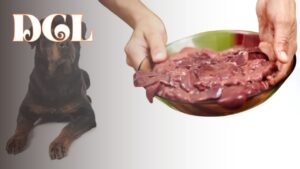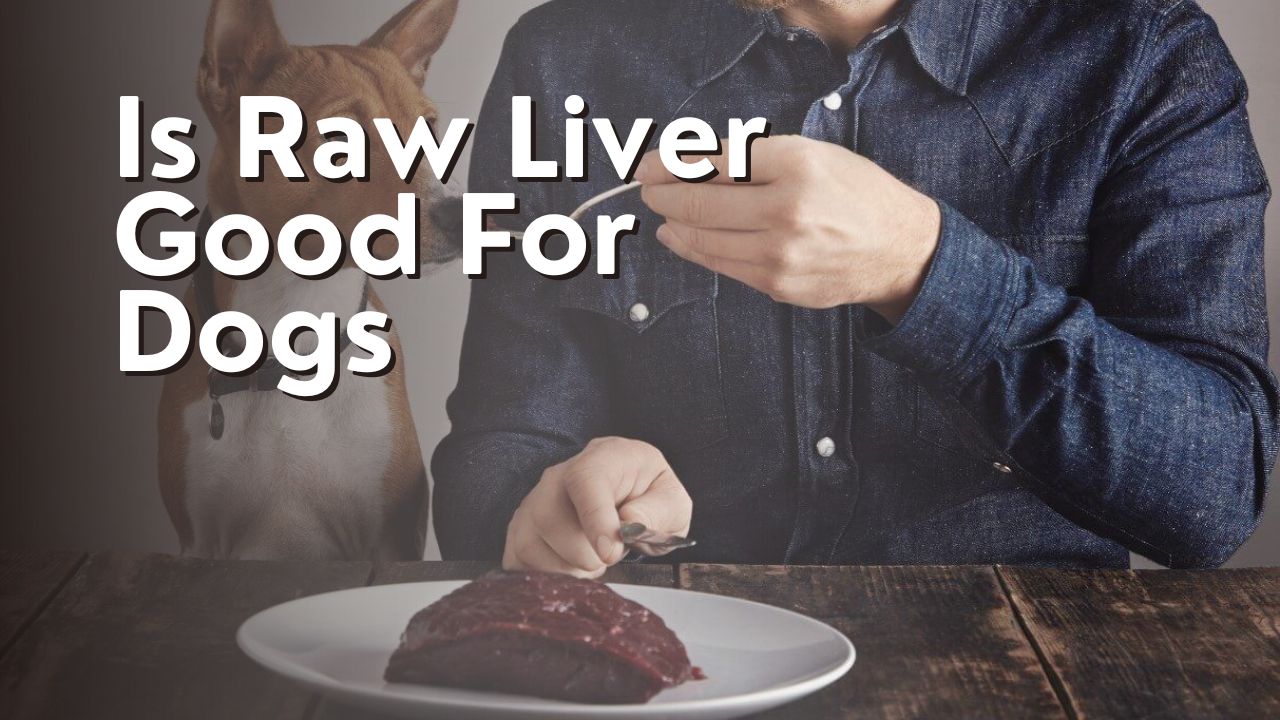I’ve always wondered whether raw liver is good for dogs. It’s a topic that many dog owners are curious about, especially those who are looking for ways to improve their furry friends’ diets.
In this article, we’ll explore the nutritional benefits of raw liver for dogs and discuss any potential risks associated with feeding it to them.
We’ll also provide precautions and guidelines for safely incorporating raw liver into a dog’s diet, as well as alternative options for liver.
Additionally, we’ll cover the signs of liver problems in dogs and the importance of consulting with a veterinarian before making any changes to your dog’s diet.
So, if you’re wondering whether raw liver is a healthy choice for your canine companion, keep reading to find out more.
- Nutritional Benefits of Raw Liver for Dogs
- Potential Risks of Feeding Raw Liver to Dogs
- Precautions and Guidelines for Feeding Raw Liver to Dogs
- Alternative Options for Liver in a Dog's Diet
- Signs of Liver Problems in Dogs
- Consulting with a Veterinarian about Raw Liver Feeding
- Frequently Asked Questions
- Conclusion
Nutritional Benefits of Raw Liver for Dogs
If you’re wondering about the nutritional benefits of feeding your furry friend raw liver, you’re in for a treat! Raw liver is a superfood for dogs, packed with essential nutrients that can greatly benefit their overall health.
One of the main benefits of raw liver is its high protein content. Protein is crucial for dogs as it helps build and repair tissues, supports a strong immune system, and promotes healthy muscle growth.
Moreover, raw liver is a great source of vitamins and minerals. It is rich in vitamin A, which is essential for good vision, healthy skin, and a strong immune system. Additionally, it contains iron, which plays a vital role in oxygen transportation and energy production. Raw liver also contains B vitamins, including B12, which aids in the formation of red blood cells and promotes a healthy nervous system.
Finally, raw liver is a natural source of omega-3 and omega-6 fatty acids, which contribute to healthy skin, a shiny coat, and can reduce inflammation.
So, feeding your dog raw liver can be a fantastic way to provide them with a variety of essential nutrients that will support their overall wellbeing.

Potential Risks of Feeding Raw Liver to Dogs
Feeding raw liver to dogs may seem tempting, but it’s important to be aware of the potential risks involved. Raw liver can contain harmful bacteria like Salmonella or E. coli, which can cause serious illness. These bacteria can be present even if the liver looks fresh and healthy. Dogs with compromised immune systems, young puppies, or older dogs are especially vulnerable and may experience symptoms such as diarrhea, vomiting, and abdominal pain. In severe cases, the infection can spread to other organs and result in death.
Another risk of feeding raw liver is the potential for nutrient imbalances. Liver is high in vitamin A, and excessive intake of this vitamin can be toxic to dogs. Symptoms of vitamin A toxicity include bone and joint pain, loss of appetite, and bone deformities. It’s important to note that cooking liver can eliminate the risk of bacterial contamination and help prevent nutrient imbalances.
If you’re considering adding liver to your dog’s diet, it’s best to consult with your veterinarian. They can provide guidance on how to do so safely and in moderation.
Precautions and Guidelines for Feeding Raw Liver to Dogs
To ensure the safety and well-being of your furry companion, it’s crucial to follow precautions and guidelines when incorporating raw liver into their diet. Raw liver can be a nutritious addition to your dog’s meals, but it’s important to handle it properly to minimize any potential risks.
First and foremost, it’s essential to choose high-quality liver from a trusted source. Look for liver that is fresh, preferably organic, and free from any additives or preservatives. Additionally, make sure to wash your hands thoroughly before and after handling the liver to prevent the spread of bacteria.
When it comes to serving raw liver to your dog, it’s recommended to freeze it for at least two weeks before feeding. Freezing helps kill any potential parasites or bacteria that may be present in the liver. After thawing, you can either serve it as is or lightly cook it to ensure any remaining pathogens are eliminated.
Another important precaution is to feed liver in moderation. While liver is a nutrient-rich organ meat, excessive consumption can lead to vitamin A toxicity. It’s best to consult with your veterinarian to determine the appropriate amount of liver to include in your dog’s diet.
By following these precautions and guidelines, you can safely incorporate raw liver into your dog’s diet, providing them with a tasty and nutritious treat. Just remember, always prioritize your dog’s health and well-being when making dietary choices.
Alternative Options for Liver in a Dog’s Diet
When it comes to feeding liver to my dog, I always prefer cooked liver as a safer alternative. This way, I can ensure that any potential bacteria or parasites are eliminated through the cooking process.
In addition to cooked liver, I also like to offer my dog commercial liver treats and supplements, which are specifically formulated to provide the necessary nutrients without the risk of contamination.
Lastly, I make sure to include other nutrient-rich foods in my dog’s diet to ensure a well-rounded and balanced meal.

Cooked Liver as a Safer Alternative
You really shouldn’t risk feeding your dog raw liver. Cooked liver is a much safer alternative that will still make them wag their tail in delight!
Raw liver can contain harmful bacteria like Salmonella or E. coli, which can make your furry friend sick. However, cooking liver thoroughly eliminates any potential health risks.
When cooked, liver becomes easier to digest and also helps prevent any nutrient deficiencies. Plus, it’s a great source of protein, vitamins, and minerals that contribute to your dog’s overall well-being.
Just make sure to avoid seasoning the liver with any harmful ingredients like onions or garlic, as these can be toxic to dogs.
So, if you want to treat your pup to a tasty and safe snack, opt for cooked liver instead of raw.
Commercial Liver Treats and Supplements
Now, let’s talk about a convenient option for liver treats and supplements: commercial products. Many pet stores offer a wide variety of liver treats and supplements that are specifically formulated for dogs. These products are often made with high-quality liver and contain added nutrients to support your dog’s overall health. They come in different forms, such as chewy treats, biscuits, or even powder supplements that can be added to your dog’s food.
Here are three benefits of using commercial liver treats and supplements:
- Convenience: These products are readily available and can be easily incorporated into your dog’s daily routine.
- Nutritional value: Commercial liver treats and supplements are designed to provide a balanced amount of nutrients that support your dog’s liver health.
- Variety: There is a wide range of flavors and textures available, ensuring that you can find something your dog will love.
So, if you’re looking for a hassle-free way to give your dog the benefits of liver, commercial liver treats and supplements are definitely worth considering.
Other Nutrient-Rich Foods for Dogs
If you’re seeking to diversify your canine’s diet, incorporating nutrient-rich foods such as lean meats, eggs, and green vegetables can provide them with a plethora of health benefits.
While raw liver is often considered a great option, there are other foods that can also contribute to your dog’s overall well-being.
Lean meats like chicken and turkey are excellent sources of protein and essential amino acids.
Eggs are packed with nutrients like vitamin A, vitamin D, and omega-3 fatty acids.
Green vegetables like spinach and broccoli are rich in vitamins and minerals that support your dog’s immune system and promote healthy digestion.
By incorporating these nutrient-rich foods into your dog’s diet, you can ensure they are getting a well-rounded and balanced meal that promotes their overall health and vitality.
Signs of Liver Problems in Dogs
Detecting signs of liver problems in dogs can be like deciphering a mysterious puzzle, with subtle clues hidden beneath the surface. As a dog owner, it is crucial to be aware of these signs, as early detection can lead to prompt treatment and a better prognosis for your furry friend.
To help you recognize potential liver problems in your dog, I have prepared a table outlining some common signs to look out for:
| Signs of Liver Problems in Dogs | ||
|---|---|---|
| 1. Loss of appetite | 2. Weight loss | 3. Vomiting or diarrhea |
| 4. Increased thirst and urination | 5. Jaundice (yellowing of the eyes, gums, or skin) | 6. Lethargy and weakness |
| 7. Abdominal pain or swelling | 8. Changes in behavior or personality | 9. Bleeding or bruising easily |
If you notice any of these signs, it is important to consult your veterinarian for a proper diagnosis and treatment plan. Liver problems can range from minor issues to serious conditions, such as liver disease or failure, so professional guidance is essential.
Remember, early intervention is key when it comes to liver problems in dogs. By staying vigilant and recognizing the signs, you can ensure your dog receives the necessary care to maintain their health and well-being.
Consulting with a Veterinarian about Raw Liver Feeding
Consulting with a vet about feeding your dog raw liver can offer valuable insights and guidance to ensure the best nutrition and health for your pet. While raw liver can be a nutritious addition to your dog’s diet, it is important to consult with a veterinarian before making any changes to their feeding regimen.
A vet can assess your dog’s overall health and determine if raw liver is a suitable option for them. During the consultation, the vet may ask about your dog’s current diet and any existing health conditions they may have. They can provide specific recommendations based on your dog’s individual needs, including the appropriate amount of raw liver to feed and any necessary supplements. They can also address any concerns or questions you may have about feeding raw liver to your dog.
Additionally, a vet can help monitor your dog’s health and ensure that they are tolerating the raw liver well. They can perform regular check-ups and blood tests to ensure that your dog’s liver and other organs are functioning properly. If any issues arise, the vet can provide appropriate treatment or adjust the feeding plan accordingly.
Overall, consulting with a veterinarian about feeding your dog raw liver is essential for ensuring their optimal health and well-being. They can provide personalized advice and support to help you make informed decisions about your dog’s diet.
Frequently Asked Questions
Can dogs eat cooked liver instead of raw liver for the same nutritional benefits?
Yes, dogs can eat cooked liver instead of raw liver and still receive the same nutritional benefits. Cooking liver can help kill potential bacteria and parasites, making it safer for dogs to consume.
How often should I feed my dog raw liver?
I feed my dog raw liver once or twice a week. It’s important to remember that moderation is key. Raw liver can be a healthy addition to their diet, but too much can cause digestive upset.
Are there any specific dog breeds or ages that should not be fed raw liver?
There are no specific dog breeds or ages that should not be fed raw liver. However, it’s always a good idea to consult with a veterinarian before making any dietary changes for your dog.
Can feeding raw liver lead to excessive weight gain in dogs?
Feeding raw liver to dogs can potentially lead to excessive weight gain if not properly balanced with other nutrients. It is important to provide a balanced diet and monitor their weight to prevent obesity.
Are there any supplements or additives that can be added to raw liver to enhance its nutritional value for dogs?
There are supplements and additives that can enhance the nutritional value of raw liver for dogs. They can provide important vitamins and minerals, such as omega-3 fatty acids, which can benefit their overall health.
Conclusion
In conclusion, I’ve learned that raw liver can be beneficial for dogs because it is highly nutritious. However, it’s important to be aware of the potential risks and take necessary precautions when feeding it to dogs. Consulting with a veterinarian is essential to ensure that the liver is given in the right portion and frequency.
Additionally, it is crucial to monitor for any signs of liver problems in dogs. Overall, raw liver can be a healthy choice for dogs when approached with caution and guidance from a professional.


